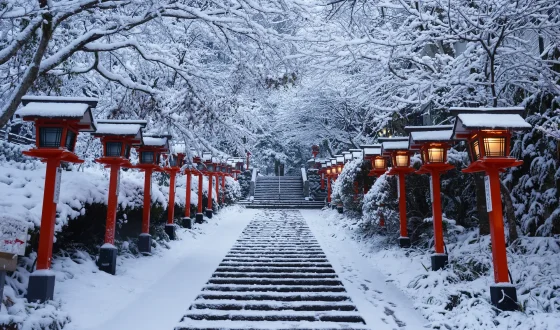A Detailed Guide On Buying A Car In Japan
Thanks to the efficient public transportation systems in Japan, it’s very easy to get around the urban areas here. However, going outside of these areas may require some forms of personal vehicles. Thus, some of you will think about the option of buying a car as the car has room for more people and things than other kinds of transportation such as motorcycle or scooter. If you want to get the most detailed guide on buying a car in Japan, you cannot miss reading this blog. Now, let’s check it out!
Before Buying A Car In Japan
1. Do Research Carefully
First of all, it is a good idea to do research before you decide to purchase a car in Japan since this can be a complex task. Things will become much easier if you do your research carefully and understand the process. Doing research will also help you decide whether you want to buy a new car or a used one.
There are many websites such as Super Street Online and Top Speed which provide different cars with a thorough comparison of their looks, features and prices. This will enable you to find the perfect car that meets your requirements before you go to visit dealerships.

It is highly recommended that do research before you decide to purchase a car in Japan.
2. Know Types Of Cars In Japan
Cars in Japan are either white plate or yellow plate. The white plate cars are the types of vehicles that are safe, spacious, good for long distance travel and can move at high speeds. On the other hand, the yellow plate cars are smaller, less safe than the white plate cars and unable to meet highway speeds. These cars don’t have much trunk or leg space and are better suitable for short distances or only around the town.
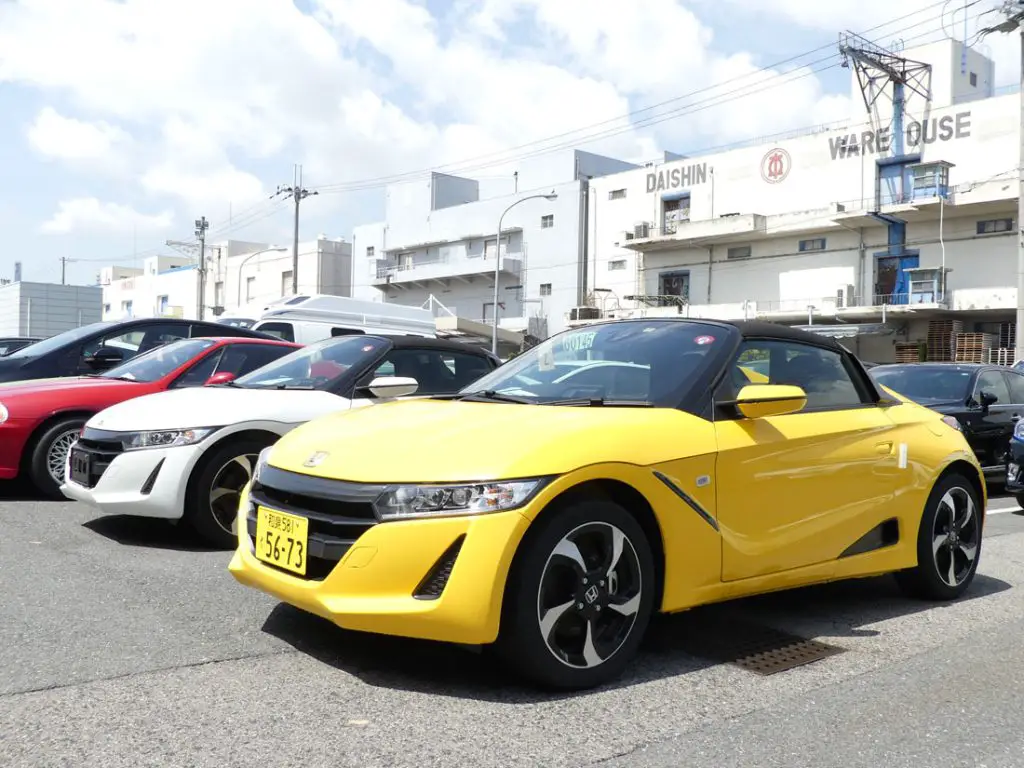
There are two types of cars in Japan which are white plate and yellow plate cars
SEE MORE:
3. Consider Hiring An Agent Or An Interpreter
Buying a car in Japan, especially a used car will be a lot easier if you have someone with you who speaks Japanese. It’s good if you have a friend who can help. Otherwise, you can consider hiring an interpreter to help you in the dealings or a vehicle agent that can assist you to buy a used car. There would be people at the dealership who can speak some English, but it’s best to have someone who speaks Japanese so that the process is easier.
Below are some words and phrases related to cars that you should know to make finding, buying and driving a car become less difficult.
| English Words | Japanese Translations |
| Car | 車 (kuruma) |
| Car dealership | カーディーラー (kadira) |
| Car accident | 交通事故 (kotsu jiko) |
| Road | 道路 (doro) |
| Drive | ドライブ (doraibu) |
| Tire | タイヤ (taiya) |
| Speed limit | 制限速度 (seigen sokudo) |
| Parking | パーキング (pakingu) |
| Vehicle inspection | 車検 (shaken) |
| Insurance Certificate | 保険証明書 (hoken shomeisho) |
4. Other Considerations
You’d better take additional things below into account before you buy a car in Japan.
-
Do You Really Need A Car?
In fact, it is quite fast and convenient to travel around the cities in Japan using public transport thanks to the efficient public transportation systems here. However, if you would like to visit the rural areas and experience the life there on the weekends or when you have free time, you may want to have your own car. Besides, if you live in Japan with your family or if you have kids, it might be a good idea to have a car for going around.
-
Should You Bring/Ship Your Own Car To Japan Or Should You Just Buy New In Japan?
It is possible and not extremely expensive to ship your car to Japan. For example, the cost to ship from anywhere in the US is between $2000 and $4000 USD and shipping from Europe can be around €3000 to €4000.
However, be prepared for lots of paperwork, insurance and import tax, and the cost of having your car declared roadworthy once it lands in Japan. All these costs may run up to another $6000 USD at least, so the whole process isn’t cheap at all.
Thus, shipping your car to Japan is not a very wise option. If that car isn’t really attached to you, it’s better to sell your old vehicle and buy a new one.
-
What Color Of The Car Will You Choose?
If you decide to buy a car instead of shipping your own vehicle to Japan, here’s a tip for you to choose the color of your new car. In Japan, the popular color for new cars is silver, but second-hand cars are usually black and white. You can own a bright-colored car if you are willing to pay more for it. Therefore, you could choose the color that you like depending on your wallet.
-
Have You Considered Hiring A Car?
If you don’t really need to buy a car, have you checked out the option of hiring one? Hiring a car is very easy with much less paperwork and it’s also cheaper than buying a car. You, of cource, must have a valid driver’s license.
Most car rental companies in Japan are located near stations, so it’s easy for you to pick up the car and bring it back before taking public transport. Besides, these companies may also offer you a free pick up service, so you can go to their office and complete the formalities for hiring a car.
Depending on your requirement, you can choose a monthly or six-monthly rental plan. The cost for hiring also includes comprehensive insurance or you can pay extra based on the number of drivers.
Things You Need Before Buying A Car In Japan
1. Work Visa
It is compulsory for you to have a valid work visa and residence card before buying a car in Japan. Also, you will need proof of residence.
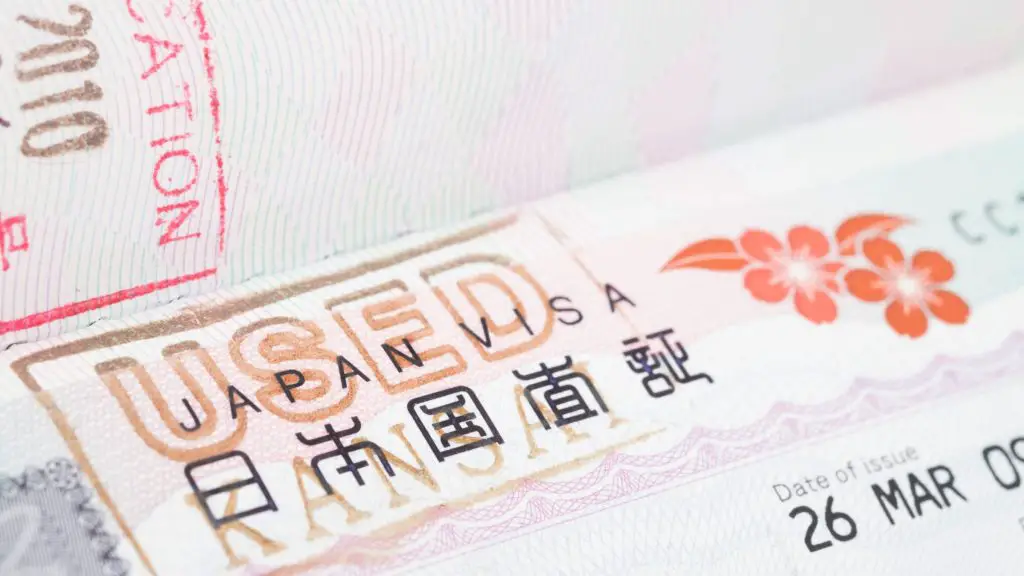
Work visa and residence card are compulsory for registering a car in Japan
2. Driving License
Of course, a driving license is absolutely necessary before you buy a car. A valid driver’s license issued in Belgium, Germany, Switzerland, France, Monaco, Sweden and Taiwan is accepted in Japan for up to one year.
When driving in Japan, you just need to carry your license and an official translated copy of the license, which you can get from the Japan Automobile federation or the embassy or consulate of your country in Japan.
In case your driver’s license is not issued in any of the above mentioned countries, you must have the International Driving Permit (IDP). As the IDP is not a valid document, you need to carry the driver’s license issued in your country and the IDP. This arrangement will expire after one year, so you can either need to get a Japanese license or go to your home country for three months and return to Japan with a new IDP.
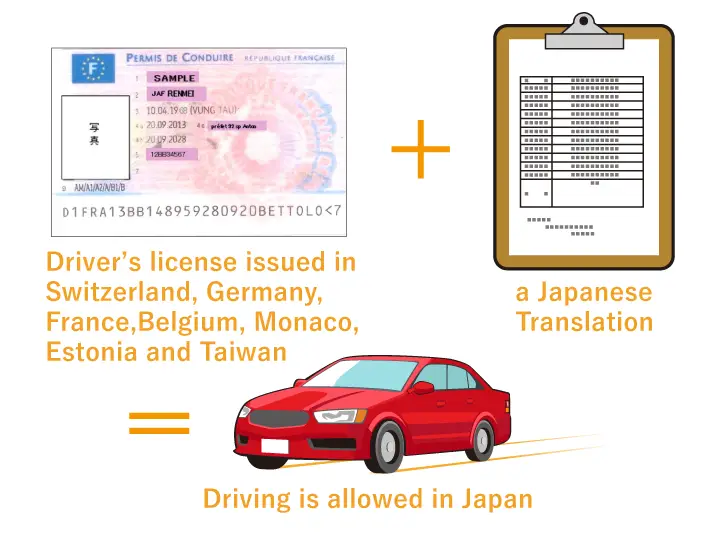
The driving license is absolutely necessary for you to buy a car.
3. Parking Certificate
According to Japanese law, you must provide evidence that you have a parking space before you can buy a car. If you live in an apartment building that has a parking space, you don’t need to rent one. If your apartment building doesn’t have any parking space, you will need to rent a space that is within 2 kilometers of your residence to park your car. Then, you need to provide Google maps proof showing your residence and the parking space to your local police station so that they can issue you a parking certificate. Besides, you will also need the Hanko stamp, which is your personal name stamp for your certificate.
The rent for a parking space is monthly and you must pay a 3 months’ worth of deposit. The cost for renting is different among areas. For instance, a parking space in Tokyo can cost up to ¥60,000 a month while that in some other areas only costs about ¥10,000 monthly or even lower.

Before buying a car in Japan, you must provide evidence that you have a parking space.
How To Buy A New Car In Japan?
With leading car manufacturing companies in Japan, it is not too difficult to buy a new car here. However, the process of buying a new car in Japan can be complicated if you don’t educate yourself well.
Actually most foreigners living in Japan don’t prefer to buy a new car because of some following reasons:
- Language barrier
- Lots of paperwork involved
- Financing is difficult due to the lack of credit card history in Japan
- A temporary residence may make buying a new car seem impractical
If you still want to buy a new car in Japan, you can go to a car dealership. Here, you must remember that the price on the car is just its base price and the comsumption tax.

In order to buy a new car in Japan, you can go to a dealership.
How To Buy A Used Car In Japan?
1. Buying A Used Car From A Dealership
Buying a used car in Japan doesn’t involve as much paperwork as buying a new car. All you need to do is filling up several forms and submitting the required documents and then the dealer will help you with most of the paperwork.
If you would like to search for details about the dealerships before visiting them, you can refer to some websites such as Euro Japan, Auto Direct and MickLay Auto. These websites are in English, so you can easily understand what is written on them. In addition, there are also some Japanese online resources available including Car Sensor, Goo-net, Camel Japan that you can check out for dealership information. If you don’t know Japanese, you can take help from someone who can understand the language.
Below are a couple of highly rated dealerships that you can consider visiting:
- Euro Japan: PMC Building, 1 Chome-23-5 Higashiazabu, Minato City, Tokyo 106-0044, Japan
- J Auto Kyoto: 72-1 Nakajima Goshonouchicho, Fushimi Ward, Kyoto, 612-8463, Japan
- Carchief: Japan, 〒533-0033 Osaka, Higashiyodogawa Ward, 1-1718−901 Higashinakajima東淀川区17 Higashiyodogawa-Ku Osaka
Visiting A Dealership
In fact, it’s relatively inconvenient to reach most dealerships in Japan. Therefore, if you are serious about buying a car, you can ask them about their pick-up and drop service.
When arriving at the dealership, you can see a lot of cars lining up in the parking lot. As you are buying a used car, make sure that you check the exterior of the car carefully to find out if it has any scratches and other physical damages or not. If the car has seat liners and mats inside, you can even check its interior. If you have knowledge of engines, you can also inspect the car’s hood. Nevertheless, most of the dealerships will not allow you a test drive because the inspection certificate has already expired for many used cars at the dealerships and it will be issued again once you have bought the car.
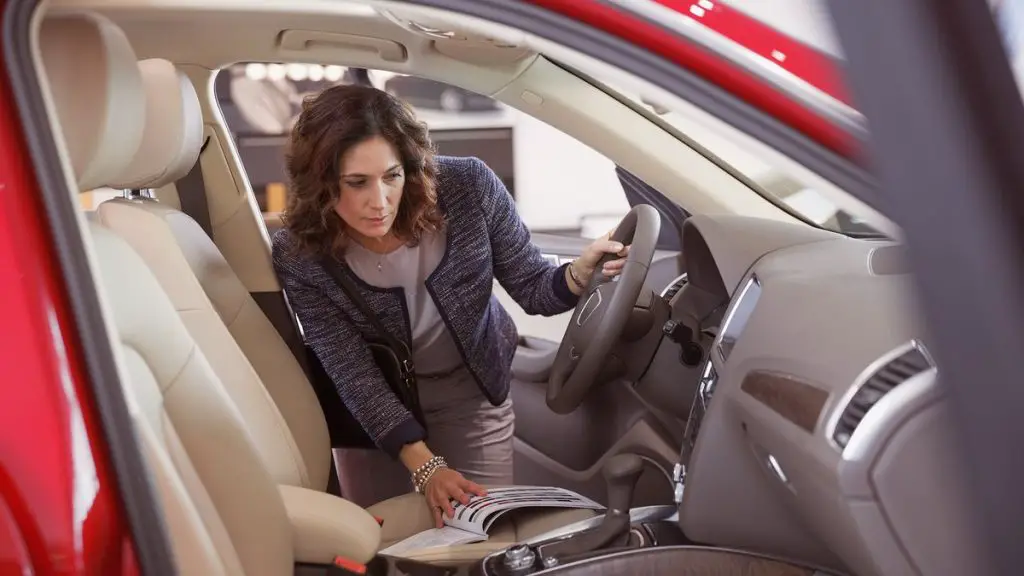
When buying a used car at the dealership, you can do any checking with the car’s interiors, exteriors as well as engines.
The salespeople at the dealership will let you do the inspection alone and will come in only when you call them. You can ask them any questions that you have. But if you want to know about the vehicle history, you shouldn’t expect to get much information.
Once you have selected the car that you want, the salespeople will invite you to sit inside that car and then they will give you an estimate. The estimate includes not only all the taxes and additional costs but also some add-ons from the dealer such as home delivery of the vehicle and service/maintenance charges. You should go through all the additional costs given carefully and choose which add-ons you don’t need to take.
The final step is negotiation, which is very common in Japan when it comes to cars. Normally, the negotiation will take place over tea, inside the dealership office.
2. Buying A Used Car From A Private Sale
Buying a car directly from a private owner can be cheaper than buying a car from a dealer. You can get the same car at a lower price without paying any taxes, but you will have to do all the paperwork yourself in order to get your car registered.
If you want to find privately owned cars for sale online, you can check out sites such as Locanto and Craigslist.

Buying a used car from a private seller can be cheaper, but be prepared to do all the paperwork yourself.
3. Buying A Used Car From An Auction House
In Japan, auto auctions are so popular that thousands of cars are sold through these auctions every day. With the participation of bidders who are often car dealers and exporters, each auction finishes in less than 30 seconds and the car belongs to the highest bidder. At the auctions, you can also find almost every type of car at different prices, which are wholesale prices. If you want to bid on any car, you can go through either a dealer or a vehicle agent. The bidding is very competitive, so you need to act fast to get the car you want.
You know what? Each car in the auction house is thoroughly inspected and some of its information is posted on a website by the inspectors. The information includes:
- The car’s pictures
- The year of manufacture
- The engine’s size, condition and mileage
- A rating based on the exterior condition of the vehicle
- A rating based on the interior condition of the vehicle
- Service history detailing major repairs, replacement of spare parts and other relevant details
- The due date of the next inspection certificate
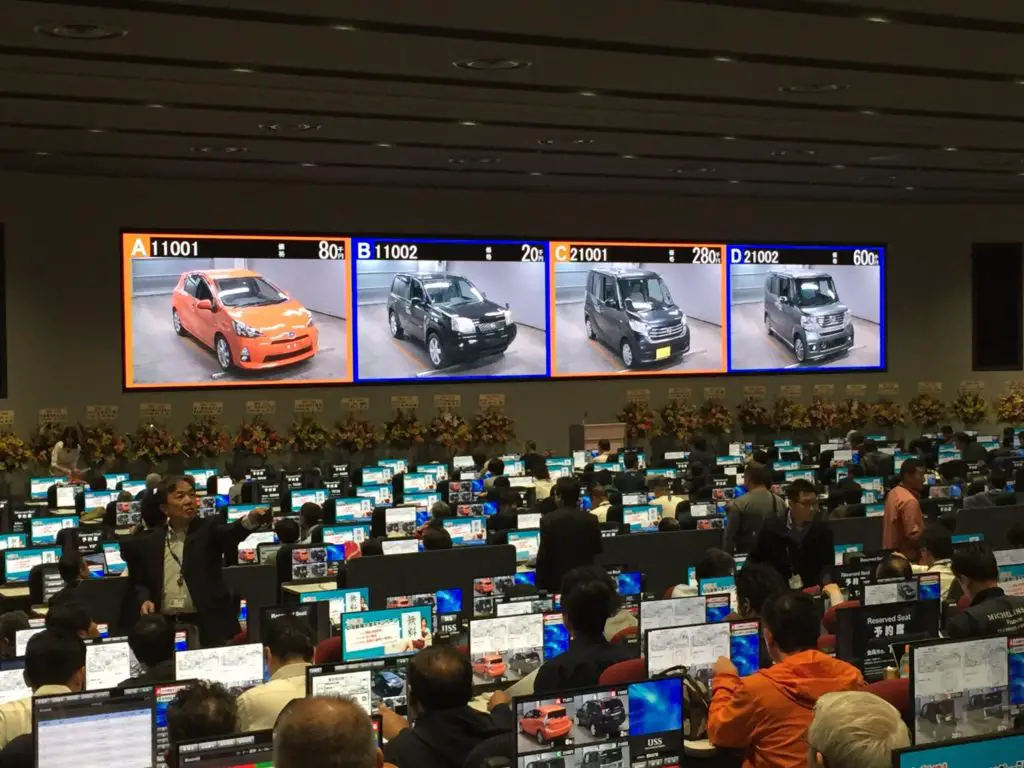
Buying a used car at an auction house in Japan can be another choice.
Additional Costs Of Buying A Car
The prices that you see on the cars at the dealership are only the base prices plus comsumption tax. There are other additional costs regarding buying a car in Japan.
1. Vehicle Inspection (Shaken)
In Japan, the 60-point vehicle inspection is mandatory at the time of registering a new vehicle. It includes thorough inspection of the safety equipment such as headlights and indicator lamps as well as functional equipment such as wheel alignment, breaks, suspension, speedometer.
The inspection is due to renewal after three years of purchasing and then every two years for the vehicle’s lifetime. The cost for the inspection includes any parts that need replacing and it can be between ¥100,000 and ¥200,000.
2. Insurance
It is compulsory for you to buy liability insurance that covers third-party insurance in case of accidents. However, this insurance provides a very limited liability cover. Thus, you should consider further insurance such as fully comprehensive insurance.

Fully comprehensive insurance will help a lot if there are any problems with your car.
3. Vehicle Registration
After buying a car, you will need to get it registered by submitting the relevant documents that you obtain from the ward office, your landlord and the local police station to the vehicle registration office. In order to get this process completed, you should ask someone who knows Japanese to help with every step.
4. Annual Vehicle Tax
Paying annual vehicle tax is also compulsory in Japan. The tax cost depends on the engine capacity. This means smaller cars have a lower tax. You may expect to pay between ¥30,000 and ¥85000 every year.
5. Weight Tax
When getting the shaken, you will see the curb weight of the car written on it. You will pay the weight tax, which is applicable when you buy a new car and then during every shaken renewal, based on that weight. The cost ranges from ¥10,000 to ¥80,000 depending on the car size.
6. Recycling Certificate
The recycling certificate proves that the car buyers have already paid for the disposal of their vehicles when the vehicles cannot be in use any more. The cost for getting the certificate depends on the material volume used in the car and it is usually between ¥10,000 and ¥50,000.
Things You Should Know About Driving A Car In Japan
This part will provide you with some knowledge about driving a car in Japan.
1. Left Side Driving
The first and foremost thing to remember when driving in Japan is that cars drive on the left side of the road, and the driver’s seat is on the right side of the car. For those who are from the UK or Australia, this may be familiar. However, it might take some time to get used to for drivers from the US and Europe.

Cars in Japan move from the left side of the road.
2. Roadside Assistance
Roadside assistance services are available in Japan, so you should save the contact details of these service providers to ask for help in case your car breaks down or there is an accident. Besides, you can use Japan Assist International that many expats prefer.
3. Drunk Driving
There is no tolerance for drunk driving in Japan. The legal limit of alcohol in the blood while driving is 0,03%. If you don’t exceed that limit but the police stop you and decide you are too intoxicated to drive safely, you can still get fined. If you exceed the permissible limit, you may face up to a prison term of 5 years or a fine of around ¥1,000,000 and the police might confiscate your driver’s license.
As Japan is a very community-oriented country, the passengers in the car whose drive is under the influence of alcohol can also be fined or prosecuted for having abetted the driver to drive. Therefore, it’s always best to avoid all alcoholic drinks if you must drive.
Frequently Asked Questions
1. Is It Cheaper To Buy A Car In Japan?
You know the car prices in Japan are the lowest in all Asian countries. Besides, the Japanese people tend to change their cars frequently because of newer cars coming. Thus, the markets for used cars are very common and those markets are where to buy a car in Japan. You can expect to get a good car at a great price there.
2. How Old Can A Car Be In Japan?
The vehicle inspection in Japan is quite costly and every car owner has to pay for it every 2 years. When the car is 10 years old, the inspection is even mandatory every year. Thus, most car owners decide to change their cars once the cars reach that age. This is the reason why you can hardly see a more than 10-year-old car in Japan.
3. What Is The Speed Limit In Japan?
On Japanese highways, the default speed limit is 100km/h (62 mph). Within the city, the speed limit is usually 60km/h (37 mph). You can refer to signs on the roads to know if the speed limit is higher or lower than this.
Conclusion
Buying a car in Japan is quite a straightforward process and you may find it more pleasant than anywhere else in the world. Hope that all of the details mentioned in this blog will help you with all the stuff related to car purchasing in the Land of the Rising Sun. If you have had any experience about buying a car here, feel free to share!



